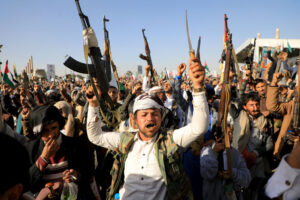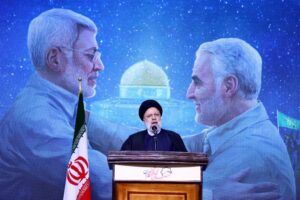There’s no denying Iran’s proxy forces are great value for money. The regime’s support for its allied militias, including the Lebanese Hizbollah, Hamas and the Houthis, probably doesn’t exceed a few billion dollars per annum — perhaps even less, given that many have their own sources of income. The Hizbollah, for instance, moves a lot of drugs, controls imports, takes cuts on Lebanese businesses, and has a mafioso-like tithing system on the diaspora Shiite community in developing countries.
Such proxies are far cheaper than Iran’s own conventional military, and more useful in the region’s many conflicts. They are also less politically divisive. Iran’s foreign wars aren’t popular among the young, who have already destabilised the theocracy through mass protests. And this is especially difficult given that Iran relies on conscription to fill at least half the ranks of the Islamic Revolutionary Guard Corps. Long-term foreign deployments of resentful draftees would be a risky strategy.
But proxy warfare is not only good politics — it is also essential to upholding Iran’s theocracy. As their religious and political legitimacy has collapsed at home, the ruling elite has sought it abroad. Iran’s clerics were ecstatic when allied militias defeated both the Sunni Arab jihadists and the United States in Iraq, and relieved when they helped to save the dictatorship in Syria in 2012. If the Assad dynasty had fallen, it could have triggered the collapse of Tehran’s entire anti-American, anti-Zionist, enfeeble-the-Sunnis strategy, which it had been cultivating since the Islamic revolution in 1979.
More recently, October 7 and the Gaza War have served as an unparalleled frisson to the antisemitic Iranian political elite, and a seductive clarion call to others in the region who thought they couldn’t make the Jews bleed. The war, with its growing Palestinian civilian death toll and the vast destruction in the Gaza Strip, may have given the clerical regime, and its overwhelmingly Shiite “axis of resistance”, a means of restoring its standing with faithful and secular Sunnis alike. Relations have been tense since the Syrian civil war, when Iran helped to slaughter tens of thousands of Sunni Arabs.
If Israel fails to destroy Hamas, if the outfit rises like a phoenix from the Gazan rubble after an Israeli withdrawal, then Iran will take credit for successfully resisting Zion and America. And a prolonged Hamas insurgency — a definite possibility if Israel reoccupies Gaza — will offer Tehran an inspirational theatre of operations. Trouble in the Gaza Strip could embolden Tehran to encourage its proxies to wound Israel and America further. The death of three US soldiers in Jordan in a drone attack last week may be just the start of it.
Yet America is unlikely to seek vengeance. Clerical meddling has so far failed to provoke Israeli and US retaliatory strikes against Iran; at the most, it has led to attacks on Iran’s Arab partners. That’s because Washington and Jerusalem dread escalation — the former, out of fear of another Middle Eastern “forever war”; the latter, because it doubts its missile defence and air power are capable of defending Tel Aviv from Hizbollah and Iran. Indeed, Tehran’s supply of missiles to its friends in Lebanon may have deterred Israel from mounting another ground invasion to secure its northern border. And the feebleness of the US and Israeli response may well have emboldened Iran’s nuclear ambitions. Iran’s supreme leader, Ali Khamenei, knows now that the power lies in his hands.
Historically, there are no Islamic parallels to what the clerical regime has pulled off. Shiism, unlike Sunnism, is a charismatic path, which lends itself more easily to revolution. Its leaders have occasionally appealed to heterodox Muslims who combined Sunni and Shiite sympathies. On conquering Iran, Ismail I (1487-1524), the first shah of the vast Safavid empire, forcibly converted his realm to Shiism. He managed for a time to win the hearts of heterodox Sufi orders in the rival Ottoman empire — that is, until defeat in war shattered his religious allure.
Today, Iran’s proxies are less ecumenical: hardcore Sunnis and Shiites feature in the “axis of resistance”. The clerical regime has developed a powerful pan-Islamic call, promising to drive the US from the Middle East, destroy Israel, humble the wealthy Western-backed Sunni Gulf Arab monarchs, and create a new Islamic culture that can withstand Westernisation. This has considerable appeal among many Arabs, as well as Shiite Afghans and Pakistanis. Such anti-American, anti-Zionist and antisemitic messaging has great sway among many young Muslim men.
But Iran doesn’t just rely on ideology. It also rewards loyalty. The idea of taking back “stolen” property has always proved alluring: just consider the first Islamic conquests, which promised booty as well as paradise, or the Crusades. The French Marxist description of Israel as a “colonial-settler state” has been fully absorbed into the Islamic lexicon. And Iran’s hope that Zion can actually be defeated in a long, bloody struggle by the faithful helps to strengthen the Islamic Republic’s credibility in the region.
The Houthis, Shiites who are doctrinally close to Sunnis and were once spurned by Iran’s clerics, have signed up to this fight. And now they’re giving the US, Israel and their European allies a hard time in the Red Sea. Even though Tehran probably fears escalation more than anyone else, neither Washington nor Jerusalem have been willing to play on these fears by striking Iran directly. The occasional assassination of Iranian nuclear scientists and senior Revolutionary Guard officers, including the dark lord, Qasem Soleimani, doesn’t really count. Nor has Washington shown any desire to hit the Islamic Republic where it’s still likely the weakest: Syria. The Revolutionary Guard general, Hossein Hamedani, who died in the battle for Aleppo in 2015, wasn’t exaggerating when he said that “to protect the accomplishments of the Islamic revolution, we had to intervene” in Syria and Iraq.
Even so, neither America nor Israel seems willing to rearm the Syrian Sunnis. A return of the Syrian civil war is just too ugly to contemplate: the refugee crisis it sparked empowered Right-wing populist parties across Europe and gave Turkey’s president, the philo-Islamist Recep Tayyip Erdoğan, extraordinary leverage within the European Union. Syrian Sunni militancy, an unavoidable by-product of a Sunni Arab rebellion, also strengthened Sunni jihadists.
But the slow-motion implosion of the Middle East dates back even further, to the aftermath of the Second World War. Since then, military autocracies have gutted traditional mores, basic decency and functioning economies. The Great Arab Revolt further shattered the region. This has left militias practically invincible since Western powers, now allergic to ground campaigns, can’t effectively use air power to extirpate them.
It is, however, still possible to shut down Iran’s proxies, but it would require significant military commitments. It’s hard to imagine any scenario — apart from a direct attack on Iran — in which the clerical regime ceases and desists. And any assault would need to be highly destructive, as a direct Western strike that leaves Iran’s nuclear-weapons programme unscathed doesn’t make much sense.
Jerusalem appears willing to pay a high price in Gaza. But given that the Gaza operation may permanently tank Israel’s reputation among Western Leftist political parties, Jerusalem may not wish to take on the even more arduous task of neutering the Lebanese Hizbollah. The group’s massive stockpile of Iranian-supplied missiles could pin-cushion Tel Aviv no matter how quickly Israel’s air force and anti-missile batteries reacted. The Hizbollah is the only Iranian proxy force whose demolition would grievously wound, perhaps cripple, the clerical regime’s ambitions in the Middle East.
America is unlikely to lend a hand — despite the most recent deadly provocation in Jordan. The White House’s truly muddled response to this surely reflects the continuing intellectual confusion of the Biden administration about Iran since Khamenei rejected another nuclear deal last summer. “We are not looking for a war with Iran,” US National Security Council spokesman John Kirby said on Monday. “We’ll keep looking at the options… We want these attacks to stop.”
But these attacks won’t stop. They’re too much fun. And they’re strategically effective: the Islamic Republic has become the dominant power in the Middle East. To give Khamenei the credit that he deserves, he has taken a weak hand and played it brilliantly. Even with Russian and Chinese patronage, the Islamic Republic doesn’t possess a lot of hard power in the face of the US and Israel. But even the greatest of the Safavid shahs, Abbas I, who defeated the Ottomans in Mesopotamia, didn’t have the influence that Khamenei now has through a motley collection of poorly-educated, young Arab men who have probably never set foot in Iran and may not have even met a Persian.
Tehran will surely keep pushing the envelope unless the United States or Israel pushes back far harder. The clerical regime may pause its operations or claim that proxies are beyond its control — but success breeds aggression. So does the regime’s conception of itself as an Islamist paladin battling American and Zionist imperialism. To paraphrase Major General Hossein Salami, the commander of the Islamic Revolutionary Guard Corps, the clerical regime isn’t “looking for a war” that it will lose.
As a result, if Washington responds to the attack in Jordan with just another air strike against Iranian-supported militias, or even Iranian deployments in Syria, this likely won’t alter Khamenei’s calculations. Only something shockingly different — US attacks against Revolutionary Guard targets inside Iran, and the openly declared threat of insurmountable American escalation — has a decent chance of convincing the clerics that the past is no longer prologue.
Disclaimer
Some of the posts we share are controversial and we do not necessarily agree with them in the whole extend. Sometimes we agree with the content or part of it but we do not agree with the narration or language. Nevertheless we find them somehow interesting, valuable and/or informative or we share them, because we strongly believe in freedom of speech, free press and journalism. We strongly encourage you to have a critical approach to all the content, do your own research and analysis to build your own opinion.
We would be glad to have your feedback.
Source: UnHerd Read the original article here: https://unherd.com/




